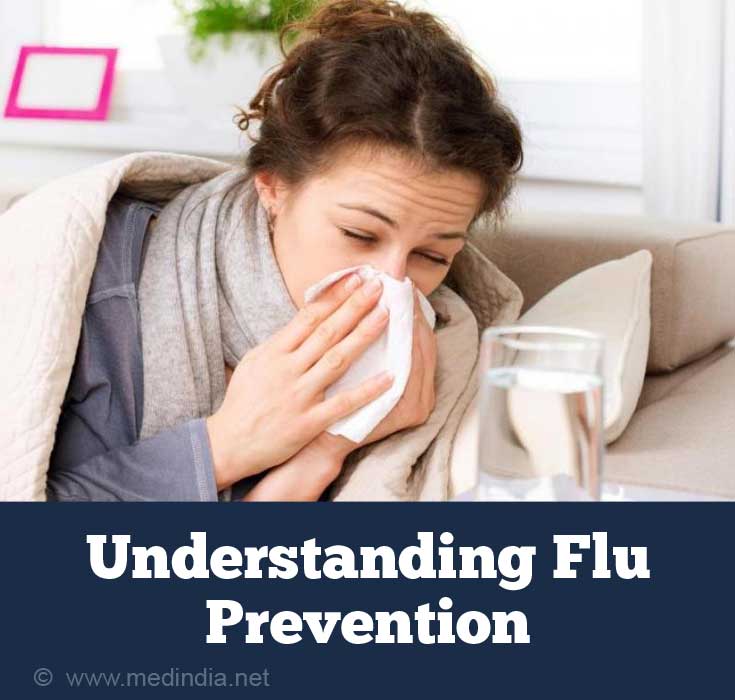- Flu - (https://www.nhs.uk/conditions/flu/)
- What You Should Know About the Flu - (https://www.health.ny.gov/diseases/communicable/influenza/seasonal/)
How to Prevent Flu?
"Good health and good sense are two of life’s greatest blessings." - Publilius Syrus
The flu isn’t just one of the most commonly used excuses used to bunk school or take the day off from work, it is quite an annoying illness that can even be rather serious at times. In most cases, the flu will simply cause temporary illness and considerable discomfort, but there are cases where it can even cause complications and fatalities. Flu symptoms like a runny nose, nasal congestion, sore throat, coughs, body aches, weakness and fever are caused by infection with the influenza virus. The symptoms can last for a week or longer and in most healthy adults will resolve naturally if there are no other complications. The risk of getting the flu is present throughout the year, but it’s most prevalent during the winter months, which is why it’s generally referred to as the seasonal flu.
Like the common cold, the flu is also spread through coughing and sneezing, which makes it highly contagious. While it’s not a condition that anyone needs to panic about, no one likes to contend with the discomfort of a bout of the flu. For others, the flu may be a bit more worrying because of factors that make you more vulnerable like old age, pregnancy or certain health conditions. As in the case of all viral infections, it’s a game of waiting it out as treatments are only directed towards providing comfort and relieving symptoms. This is why the old adage ‘prevention is better than cure’ rings most true when confronting the influenza virus.

The seasonal flu doesn’t have to put you out of action and take up so many days of lost productivity each year however. There are ways in which you can take charge and minimize the risk of infection and here are some flu prevention tips to help you get started:
- Hygiene: Always maintain the highest levels of personal hygiene. The main risk of infection when you travel and come in contact with people is through touching contaminated surfaces like bus railings or door handles or through direct physical contact. You don’t need to turn into Adrian Monk and use sanitizer each time you turn or knob or shake a hand, but it doesn’t hurt to wash your hands thoroughly as frequently as you can.
- Sleep: While avoiding close contact with people and washing your hands frequently may spare you some infectious diseases, if your immune system is compromised you’re still going to be at risk of infection. Getting adequate sleep is the best and most effective way to boost your immunity naturally. Individuals who do not get adequate sleep are at a significantly higher risk of succumbing to various infections, the flu included. Lack of sleep also impedes recovery.

- Eat Healthy: Healthy eating is important as it strengthens your immune system and boosts your overall health. Try to include plenty of fresh fruits, especially citrus fruits, in your regular diet as they are high in vitamins C and A, which make them invaluable to the health of your immune system.
- Vaccination: Vaccination against the flu is still viewed by many as being unnecessary and infective. But is a 50% success rate really all that ineffective? What others choose to see as glass half empty you can look at as glass half full. This is especially important if you are in a high risk group like a young child, aged adult or an individual with an immune-compromised system. Besides, when there is a risk of fatality, isn’t a 50% chance of survival worth the risks?
- Stay Active: Individuals who live an active lifestyle are generally in far better shape and are a lot fitter, and consequently a lot less vulnerable to illness and infections. Exercising regularly goes a long way to strengthening immune function.
- Common Courtesy: Sometimes common courtesies like covering your mouth when coughing or sneezing can go a long way to helping curb the spread of infection. It isn’t just polite to cover your mouth when you cough or sneeze, but it makes sound medical sense as it restricts the dispersion of germs.
- Kick the Butt: Smoking significantly increases your risk of picking up almost any infection especially those that affect the respiratory tract. Studies have shown that smoking also decreases immune response and destroys cilia, which are tiny hair like fibers that normally help filter out airborne germs and particulate matter.
- Be Positive: We’ve heard it all too often before, but that doesn’t make it any less true. Being happy and cheerful really does keep you healthy and studies now show that your moods affect immune function, with happiness boosting it, while depression reduces immune function.
The flu vaccine could be one of the most effective ways to prevent infection, but the success rate is just around 50% because of the high mutability of the influenza virus. There are various strains of the virus constantly evolving to cause new types of flu infection, making it difficult to create a foolproof virus. Nevertheless, it remains the first line of defense and is recommended by both the CDC and the NHS in the US and UK respectively. If despite all of these efforts to prevent infection you still find yourself down with the flu try not to beat yourself up about it. Sometimes infections occur despite our best efforts. Most healthy adults require little to no treatment and natural flu remedies like salt water gargles, sipping on ginger honey tea and steam inhalation may suffice and provide some relief. If the symptoms are severe or if there is no response to home care, make sure to seek medical care.






